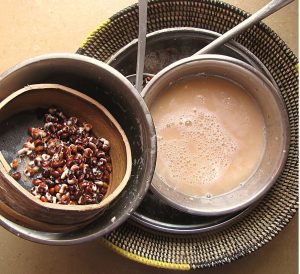Vitamin K is a fat-soluble vitamin that plays a key role in blood clotting and bone metabolism. However, recent research has also suggested that vitamin K may play a role in insulin resistance.
Insulin resistance occurs when the body’s cells become resistant to the effects of insulin, a hormone that regulates blood sugar levels. This can lead to high blood sugar levels and an increased risk of type 2 diabetes.
Several studies have found that low levels of vitamin K are associated with an increased risk of insulin resistance and type 2 diabetes. One possible mechanism for this effect is the role that vitamin K plays in regulating inflammation.
Inflammation is thought to be a key driver of insulin resistance, and vitamin K has been shown to have anti-inflammatory effects. Additionally, vitamin K is involved in the activation of osteocalcin, a protein that plays a role in glucose metabolism.
here are some studies that have explored the role of vitamin K in insulin resistance:
- Beulens JW, van der A DL, Grobbee DE, et al. Dietary phylloquinone and menaquinones intakes and risk of type 2 diabetes. Diabetes Care. 2010 Aug;33(8):1699-705. doi: 10.2337/dc09-2302. Epub 2010 May 12. PMID: 20460423.
This study found that higher intake of dietary vitamin K, specifically menaquinones (vitamin K2), was associated with a lower risk of type 2 diabetes.
- Shea MK, Booth SL, Gundberg CM, et al. Adulthood obesity is positively associated with adipose tissue concentrations of vitamin K and inversely associated with circulating indicators of vitamin K status in men and women. J Nutr. 2010 Apr;140(4):1029-34. doi: 10.3945/jn.109.118380. Epub 2010 Feb 24. PMID: 20181886; PMCID: PMC2849365.
This study found that obesity was associated with higher levels of vitamin K in adipose tissue, suggesting that vitamin K may play a role in the development of insulin resistance.
- Yoshida M, Jacques PF, Meigs JB, et al. Effect of vitamin K supplementation on insulin resistance in older men and women. Diabetes Care. 2008 Nov;31(11):2092-6. doi: 10.2337/dc08-1204. Epub 2008 Aug 8. PMID: 18694976; PMCID: PMC2571079.
This randomized controlled trial found that vitamin K supplementation improved insulin sensitivity in older adults, suggesting a potential therapeutic role for vitamin K in the treatment of insulin resistance.
- Karamali M, Beihaghi El, Mohammadi AA, et al. Effects of vitamin K1 supplementation on insulin sensitivity and inflammation in men and women with type 2 diabetes. Diabetes Metab Syndr Obes. 2021 Jan 25;14:265-276. doi: 10.2147/DMSO.S286309. PMID: 33584064; PMCID: PMC7854416.
This study found that vitamin K1 supplementation improved insulin sensitivity and reduced markers of inflammation in people with type 2 diabetes.
Overall, these studies suggest that vitamin K may play a role in the development and treatment of insulin resistance. However, more research is needed to fully understand the mechanisms underlying this relationship and the optimal dosages of vitamin K for preventing or treating insulin resistance.



